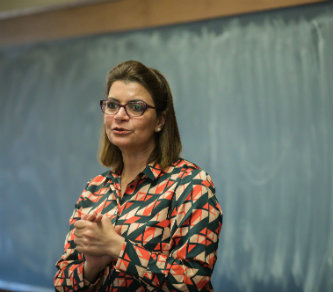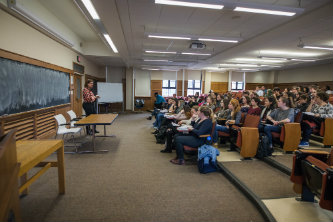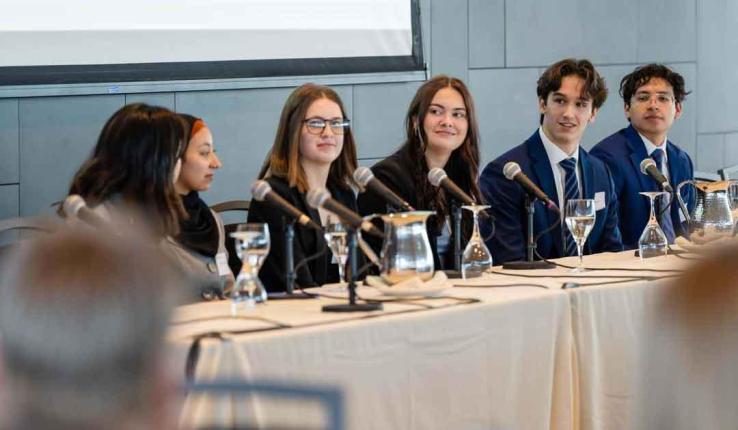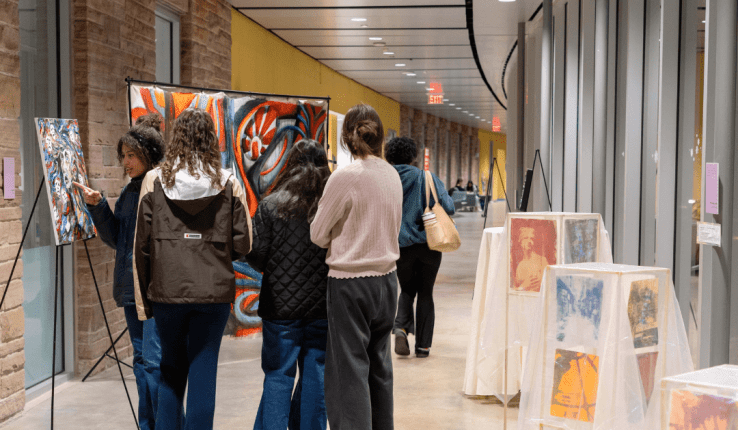Nisreen El-Hashemite: ‘Do What You Love’
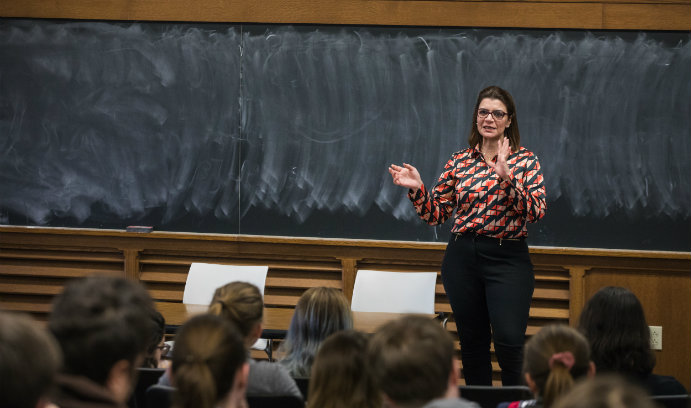
Dr. Nisreen El-Hashemite, a leading voice for the empowerment of women, visited Lehigh campus and meets with students and faculty.
When Dr. Nisreen El-Hashemite feels discouraged, she writes a letter to her hero, Muhammad Ali. She never expects a response (Ali died in 2016) but she never puts the letters in the mail anyway. Instead, they serve as personal pep talks.
Ali knew he was handsome and irresistible, El-Hashemite reasons, so why can’t she channel that confidence? So far, the process has proved successful.
“I get strength from my role models,” said El-Hashemite, the granddaughter of King Faisal (I) Bin El-Sharif Hussein, the first king of modern Iraq.
There’s another Muhammad on her list of role models—the prophet Muhammad, founder of Islam. Her family traces its roots to Muhammad.
El-Hashemite, a princess and a leading voice for the empowerment of women, visited the Lehigh campus on March 6 and met with the student groups Women in Science and Engineering and the Society of Women Engineers.
“Whatever you choose to do in life, whether you are a woman or a man, always do what you love,” she told the students. “Don’t do what others want you to do. Just do what you believe in and do what is benefitting others.”
El-Hashemite defies royal stereotypes. She holds four degrees, including a medical degree and a doctorate of philosophy in human genetics. She is the founder and executive director of The Royal Academy of Science International Trust, a non-governmental organization that supports initiatives in science, education, global health, sustainable development and gender equality. She also organizes and hosts the International Day of Women and Girls in Science, an annual conference at the United Nations that facilitates a discussion about gender equality in STEM fields. With a resume like hers, she finds it’s easy to get overwhelmed, she said.
Bill Hunter, the director of fellowship advising and UN programs at Lehigh, coordinated El-Hashemite‘s visit to the Lehigh campus. Hunter had met her on six occasions before her Lehigh visit, each time at the UN.
She is “the one singular leading voice for the empowerment of women and girls in STEM at the UN,” Hunter said. “She is without a doubt the distinct voice of making it possible, bringing light to empowering women, breaking those glass ceilings, giving them a voice and opportunity at the UN.”
He brought El-Hashemite on a tour of Lehigh’s molecular genetics lab and to various meetings with faculty members, and Hunter said he was amazed by how she engaged all levels of the Lehigh community in such a personal way. But it was the event at the end of the day that El-Hashemite was most excited about—the hour-long conversation with the student groups.
El-Hashemite spoke to about 50 students about her background in science and medicine. While pursuing her degrees, El-Hashemite said she was repeatedly told STEM was not for royalty. (El-Hashemite’s family lived in exile following the 1958 coup in Iraq that dissolved the Hashemite monarchy.) She said she was asked where her security guards were and why she wasn’t wearing a tiara or ball gown. She got through it with her letters to Ali and pep talks, she said, much like the one she gave to those gathered in Packard 466 for her visit.
When Melike Kurt saw the announcement that El-Hashemite was visiting campus, she was flooded with memories from her childhood. Kurt, a fourth-year doctorate student in mechanical engineering, grew up in Turkey, and her grandfather would tell her stories about the Prophet Muhammad and his family lineage. She knew she had to attend the event.
“Her background and the way she uses her influence to advocate for gender equality in science on an international stage is simply inspirational,” Kurt said.
As a woman in a field dominated by men, Kurt said she has questioned her leadership capabilities and her confidence has been affected. Kurt said she was finding it hard to motivate herself when it seemed like every step forward meant two steps back. During the Q&A portion of the event, Kurt sought reassurance from the woman she considers a role model.
Kurt asked El-Hashemite if she too has overwhelming feelings of discouragement at times. “Yes, every day,” she responded. Although El-Hashemite acknowledged it might be difficult at times, she emphasized the importance of maintaining positivity and confidence.
“If you feel like you’re inferior, you will never achieve anything,” El-Hashemite said. “It is you who makes your life beautiful or not.”
Honest interactions like that one are what prompted Hunter, when asked by his colleague to describe El-Hashemite, to respond with one word: “real.” She has supported herself ever since her first paycheck as a doctor in London. She prefers jeans to dresses and rarely wears makeup. In her free time, she said, she likes to paint, practice belly dance and watch Turkish television shows. If that weren’t enough, she declared her love for Phil Collins and offered to sing one of his songs to the students.
It was 30 minutes past the scheduled ending time when El-Hashemite wrapped up her conversation with students. She had insisted on answering every question despite being warned that a snowstorm was quickly approaching Bethlehem. She picked up a piece of chalk and, on the blackboard behind her, wrote the Arabic word for “thank you.”
“Thank you,” she said. “I love you. Now let’s take a selfie.”
Story by Emily Ward
Posted on:


